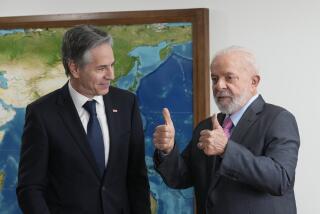Also Wants Banks to Lower Interest Rates : Brazil to Seek New Foreign Loans
- Share via
BRASILIA — Brazil will ask its foreign creditors to extend new loans this year and reduce financing costs when negotiations resume next week on its $104-billion foreign debt, Finance Minister Francisco Dornelles told Congress here Wednesday.
Dornelles also told a meeting of the Chamber of Deputies that the International Monetary Fund will have to accept “more realistic” goals for reducing Brazil’s inflation, which reached an annual rate of 227% before the present government took office in March. Bank controls were imposed in April, and the inflation rate fell to 7.2%, the lowest in 23 months.
Dornelles said deep cuts would have to be made in government spending to reduce a prospective budget deficit of 85 trillion cruzeiros, or about $17 billion, if inflation is to be contained. But he also said that many government investments would have to be maintained to attain a 4% growth rate this year.
“We can’t refuse to negotiate on the debt, but our creditors must realize that a country of 130 million people can’t stop growing, and this must be taken into account in the negotiations,” Dornelles said.
Brazil’s economic growth rate in 1984 rose to 3.5% after three years of deep recession in which unemployment hit 12% and national production fell 20%.
After his speech, Dornelles left for Washington, where he will meet today and Friday with Treasury Secretary James A. Baker III, Federal Reserve Board Chairman Paul A. Volcker and Jacques de Larosiere, the IMF’s managing director.
The meetings will set the stage for formal resumption of negotiations in New York between Antonio Carlos Lemgruber, president of Brazil’s central bank, and the steering committee representing more than 600 banks that are Brazil’s creditors.
Dornelles’ presentation of the economic program of the new administration headed by President Jose Sarney was designed to mobilize support from the senators and deputies for the government’s strategy on the foreign debt and the difficult decisions that must be made to control inflation.
The enormous budget deficit amounts to 6% of Brazil’s estimated gross national product. In the last three years, while Brazil has been formally under an IMF stabilization program, the inflation rate has doubled and the internal debt, which has been used to finance budget deficits, has increased threefold.
Early this year, the IMF suspended payments of $1.6 billion remaining from an original stabilization loan of $4.4 billion because the government of President Joao Figueiredo had violated spending limits signed in December.
Figueiredo’s chief economic policy-maker, Minister of Planning Antonio Delfim Neto, had followed the practice of signing agreements with the IMF that could not be fulfilled but that gave Brazil access to debt refinancing from the commercial banks that hold 75% of the total debt. Now, Dornelles said, agreements with the IMF will be “more realistic,” with targets for reducing inflation, increasing exports and reducing deficits that “can be fulfilled.”
More to Read
Sign up for Essential California
The most important California stories and recommendations in your inbox every morning.
You may occasionally receive promotional content from the Los Angeles Times.











